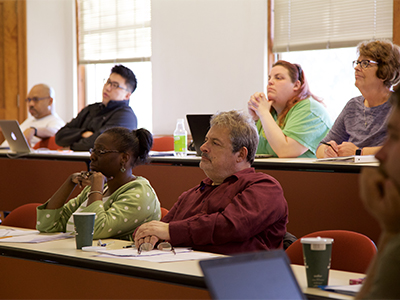Pittsburgh Seminary Launches Reimagined Master's Curriculum, Introduces New Degrees and Certificates
To continue our centuries-long history of preparing women and men for a wide variety of Christian vocations, in the fall of 2018 Pittsburgh Theological Seminary will begin offering a retooled curriculum for theologically reflective and contextually engaged ministry in the way of Jesus. The new, semester-based curriculum, plus January and summer terms, offers students greater access and flexibility to explore electives, deepen their writing skills, and learn more about their own faith tradition and those of others through three master’s programs, five credit-bearing certificates, and the Doctor of Ministry degree.
“One of the most important gifts we can foster in our students is a sense of discernment: the ability to recognize God when God shows up, to see how God is at work even in our rapidly changing culture, and to invite people to get in on what God already is doing.”
“Given the intentional integration between disciplines built into the new curriculum, the longer, 13-week semesters provide temporal space for this important integrative work to be done in each course,” comments the Rev. Dr. Heather Hartung Vacek, vice president for academic affairs and dean of faculty and associate professor of church history.
 The significantly revised M.Div. curriculum has four major characteristics: deep integration between the classical theological disciplines and the missional context of the church; context as a partner for learning; vocational discernment; and ecclesial formation. The M.Div. will continue to offer two popular options for focusing one’s program—the Emphasis in Church Planting, and the Graduate Certificate in Urban Ministry—as well as joint-degree options in social work (with University of Pittsburgh), law (with Duquesne University), and public policy (with Carnegie Mellon University).
The significantly revised M.Div. curriculum has four major characteristics: deep integration between the classical theological disciplines and the missional context of the church; context as a partner for learning; vocational discernment; and ecclesial formation. The M.Div. will continue to offer two popular options for focusing one’s program—the Emphasis in Church Planting, and the Graduate Certificate in Urban Ministry—as well as joint-degree options in social work (with University of Pittsburgh), law (with Duquesne University), and public policy (with Carnegie Mellon University).
"I am excited about the ways our new curriculum brings the context of ministry into conversation with Scripture, theology, and the arts of ministry. Preparation for ministry requires genuine integration of context and experience with deep engagement with the traditional disciplines of theological formation—just what is provided by this new curriculum,” says the Rev. Dr. David Esterline, president and professor of cross-cultural theological education.
Degree Programs
The three master’s degrees offer paths to a variety of vocational goals:
- The Master of Divinity degree, a professional program, prepares individuals for ordained ministry and general pastoral and religious leadership in congregations and other settings. In the revised curriculum, a year-long Field Education course supplements the year-long field education placement, and all M.Div. students are required to complete a cross-cultural experience—either around the globe or in our neighborhood. At 81 semester credit hours, the M.Div. program takes three years to complete if pursued full time.
- The Master of Arts in Pastoral Studies equips women and men for ministerial leadership in congregations and other settings. The program provides grounding in core disciplines and gives students the opportunity to select from a variety of ministerial electives to suit their interests and vocational needs. To complete the program, students produce a final project related to their specific ministerial context. At 48 semester credit hours, the MAPS program takes two years to complete if pursued full time.
- The Master of Theological Studies, which offers flexibility to tailor the course of study, cultivates focused understanding of one or more theological disciplines as preparation for further graduate study or for general educational purposes. At the end of the program, each student completes a final project that explores more deeply a chosen area of concentration. Also at 48 semester credit hours, the MTS program takes two years to complete if pursued full time.
The Doctor of Ministry program will continue to offer focuses for experienced Christian ministers.
Certificate Programs
Stand-alone graduate certificates in Urban Ministry and in Church Planting and Revitalization will provide non-degree opportunities for furthering one’s equipping for Christian service. Additionally, the Seminary now offers three new graduate certificate credit-bearing certificates.
- Students enrolled in the Graduate Certificate in Ministry receive a foundational understanding of ministry equipping them for broad service to the church. At 12 semester credit hours, the Graduate Certificate in Ministry takes one year to complete if taking two classes per semester.
- To prepare students for leadership in congregations or other agencies, the Seminary offers the Graduate Certificate in Missional Leadership. At 12 semester credit hours, the Graduate Certificate in Ministry takes one year to complete if taking two classes per semester.
- The Graduate Certificate in Theological Studies provides students with a general introduction to theological inquiry. At 12 semester credit hours, the Graduate Certificate in Ministry takes one year to complete if taking two classes per semester.
The Rev. Dr. Edwin Chr. van Driel, Directors' Bicentennial Associate Professor of Theology, adds, “One of the most important gifts we can foster in our students is a sense of discernment: the ability to recognize God when God shows up, to see how God is at work even in our rapidly changing culture, and to invite people to get in on what God already is doing.”
